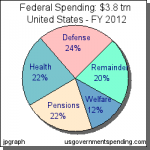A good way of visualizing and playing with the budget.
Administration's current budget (only items above $10 Bn):
$921.6 Bn - Health and Human Services (mostly Medicare/Medicaid)
$885.3 Bn - Social Security
$620.3 Bn - Defense
$519.5 Bn - Treasury (for example: Interest on the Debt)
$154.7 Bn - Agriculture
$137.4 Bn - Veterans Affairs
$94.9 Bn - Personnel Management
$89 Bn - Labor
$74.3 Bn - Transportation
$57.4 Bn - Civil Defense Programs
$55.7 Bn - Education
$45.1 Bn - Homeland Security
$44 Bn - Housing
$37.4 Bn - International
$32.3 Bn - Energy
$31.6 Bn - State
$30 Bn - Justice
$17.7 Bn - NASA
$11.4 Bn - Interior
Going forward, however, the
real driver of the spending and debt is Medicare. Everyone from Bill Clinton to President Obama to the CBO to the IMF to Bowles-Simpson to Paul Rayn agree that Medicare is the main problem, and there is no way to afford it as currently strutured.

